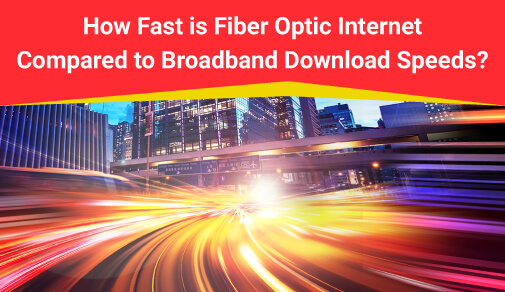Fiber Optic Internet vs. Broadband
-
70
-
30 May 2022
-
3 minutes

Individuals in the modern environment want reliable, uninterruptible internet access not only for business but also for personal reasons. The internet connection you select has an impact on your productivity and efficacy both during and after work hours. Broadband and Fiber are the two main types of internet connections available. The structure, functionality, cost, speed, and even reliability of these home internet types vary.
The average internet user is unaware of the distinctions between various types of internet access. Most options provide high-speed internet access, but they differ in a number of ways. And, as a business, you want to invest in an internet connection that provides the most dependable service for your budget and requirements.
Broadband vs Fiber: The Fundamentals
Broadband cable employs the same coaxial cable that is used to bring cable TV into homes. The copper core of a coax cable is insulated by aluminium, a copper shield, and an outer plastic layer.
- Coax cable can supply both an internet connection and a television network at the same time. This enables service providers to combine the two services. To access broadband cable internet, however, users must have a cable modem and a cable modem termination system.
- Fiber-optic technology, on the other hand, is thought to be more advanced. Why? Because it transmits information in the form of modulated light through small, flexible glass strands. Fiber's thin glass strands can transmit digital data over very long distances.
Availability of Fiber vs. Cable
Cable networks are easily accessible and available nearly all around the country. If you can connect to a television network, you can connect to cable internet. All you have to do is call your television provider and request an installation.
Despite its expansion, fibre internet connections are not as widely available as cable internet, though they are more readily available than they were previously. They are currently available in approximately 25% of locations, and 10 Gb is becoming more common in metropolitan areas. Fiber may be more difficult to obtain for businesses in outlying areas, but it is ideal for major metropolitan areas.
Fiber vs. Cable: Which is Faster?
The cable network's download speed ranges from 10 to 500 megabits per second (Mbps). Its upload speed ranges between 5 and 50 Mbps. This broadband speed is adequate for the majority of small businesses and homes.
The cable network's speed is sufficient for heavy downloading, video streaming, and gaming. However, because it is a shared network, the network speed slows when traffic is heavy. During peak periods, you can expect up to a 25% reduction in speed.
Fiber-optic internet services are faster than cable networks, with speeds ranging from 250 to 1,000 Mbps in both directions. Many people can connect to the fibre network at the same time without negatively impacting overall performance.
| Length and type of media | Approximate size | 1Mbps | 5Mbps | 10Mbps | 20Mbps | 100Mbps | 1000Mbps (Gigabit) |
| 4-minute song | 4 MB | 30s | 5s | 3s | 1.5s | 0.3s | 0.03s |
| 5-minute video | 30 MB | 3m | 40s | 26s | 13s | 2.5s | 0.2s |
| 9-hour audiobook | 110 MB | 10m | 2m | 1.5m | 46s | 9.2s | 0.9s |
| 45-minute TV show | 200 MB | 20m | 5m | 3m | 1.5m | 16s | 1.7s |
| 45-minute HDTV show | 600 MB | 1h | 15m | 8.5m | 4m | 50s | 5s |
| 2-hour movie | 1.0-1.5 GB | 2h | 24m | 21.5m | 10.5m | 1.5m | 8s |
| 2-hour HD movie | 3.0-4.5 GB | 6h | 72m | 60m | 32m | 4.5m | 25s |
| Misc. Archive | 10 GB | Forget it | Nope | Too long | Slow | Better | 1m 20s |






